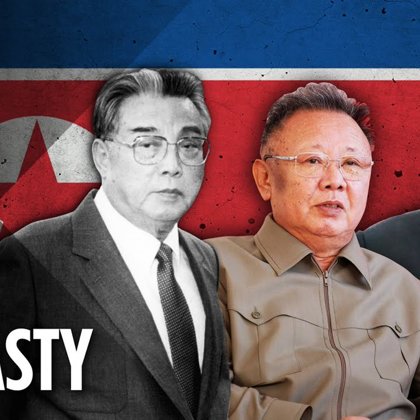THE POWERFUL DEPICTION OF NORTH KOREA UNDER KIM DYNASTY ,IN FACT,NORTH KOREA HAS ONE OF THE LARGEST ARMIES IN THE WORLD.NORTH KOREA SPENDS ABOUT ONE THIRD OF IT'S NATIONAL INCOME ON THE MILITARY.
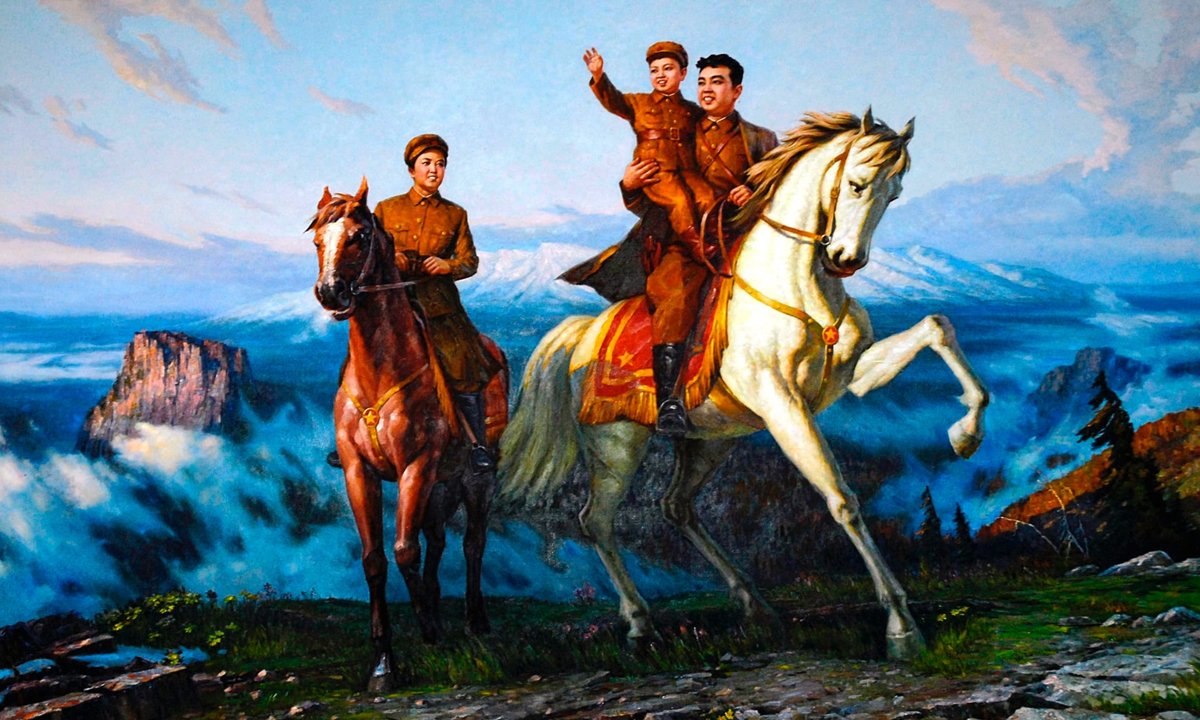 Communist North Korean founder Kim Il-Sung,Kim Jong Un's Grandfather (1912 – 1994) was the leader of North Korea from its establishment in 1948 until his death in 1994. He held the posts of Premier from 1948 to 1972 and President from 1972 to 1994.Son Kim Jong-Il, center, and grandson Kim Jong-Un.Kim Jong-il in the arms of mom and his father, Kim Il-sung.After his father’s elaborate public funeral, Kim Jong-il dropped out of
sight and it was some time before it was clear that he had established
his grip on power. Under his newly-organised government, Kim’s deceased
father was deemed “Eternal Leader” and the presidential post left
unclaimed. It was three years before Kim took over the leadership of the
ruling Korean Workers’ Party, though officially the country remained a
necrocracy.
Communist North Korean founder Kim Il-Sung,Kim Jong Un's Grandfather (1912 – 1994) was the leader of North Korea from its establishment in 1948 until his death in 1994. He held the posts of Premier from 1948 to 1972 and President from 1972 to 1994.Son Kim Jong-Il, center, and grandson Kim Jong-Un.Kim Jong-il in the arms of mom and his father, Kim Il-sung.After his father’s elaborate public funeral, Kim Jong-il dropped out of
sight and it was some time before it was clear that he had established
his grip on power. Under his newly-organised government, Kim’s deceased
father was deemed “Eternal Leader” and the presidential post left
unclaimed. It was three years before Kim took over the leadership of the
ruling Korean Workers’ Party, though officially the country remained a
necrocracy.
Kim Il-sung (1912–94) of North Korea. He began his 46-year rule as a committed Marxist-Leninist but eventually created his own postcommunist Juche ideology of self-reliance. In the process, he perpetuated a personality cult and a savior dynasty.The Kim dynasty, officially called the Mount Paektu Bloodline, is a three-generation lineage of North Korean leadership descending from the country's first leader, Kim Il-sung, in 1948. Kim came to rule the North after the end of Japanese control in 1945 split the region. He began the Korean War in 1950 in an attempt to reunify the entire peninsula. Kim developed a cult of personality closely tied to their state philosophy of Juche, which was later passed on to his successors: his son Kim Jong-il and grandson Kim Jong-un.Kim Jong-il (like Joseph Stalin, Saddam Hussein, and many other dictators) protects his elite core while shifting the burden of sanctions to the people. A more effective economic lever with which to move the regime would be to directly threaten its access to hard currency and luxury goods, which it needs to bribe elites. Policies such as freezing North Korean assets overseas and embargoing luxury items are thus the most promising options.Socialist societies with ideology-based political systems, such as North Korea, are known to treat not only essential but also minor issues with the highest level of secrecy. This is because in a system where coordination is highly centralized, political power monopolized and executed by a strictly hierarchical command structure, the top leadership is responsible for the slightest detail. So every failure is seen as the leadership's responsibility, and information is carefully filtered to protect the leadership and the political system itself. However, this obsession with tight control of information is one of the weaknesses of the system. Politically aware people in state socialist countries tend to read official publications much more carefully than their compatriots in liberal democracies. Often, they discover messages that the leadership prefers not be publicly unveiled. While the state-controlled media may not provide information on many issues, we can be sure that it reflects the leadership's point of view, since it is their job to communicate this position to the population. Even in an ideology-based society, including one in which a powerful dictatorship rules, leaders have to justify what they do.It is difficult to imagine that the question of leadership after Kim Jong-il would not be prepared carefully by the mass media in North Korea. This is why analysts instantly react to unusual reports about personalities such as the mothers of Kim Jong-il's sons or other relatives. If there were to be an announcement of a new leader, careful readers of the Rodong Sinmun would in all likelihood know it in advance because the North Korean people need to be prepared to ensure their acceptance. No announcement such as "Successor of Chairman Kim Jong-il Chosen". But what about this: "Monument to Party Founding Draws Endless Crowd of Visitors". This might be just another form of dull report on events that nobody cares about except the editors and their bosses. But it also might be the missing hint that we seek. To begin with, it is remarkable that there are many monuments to Kim Il-sung, but none to Kim Jong-il, and none to the military as an institution (though there are numerous ones to specific soldiers and battles). The only political entity beyond the Eternal President that is honored by a monument is the Party. The monument was built in 1995, which was not only the 50th anniversary of the official Party founding day, but also one year after the death of Kim Il-sung and still before the announcement of the Military First Policy (Seongun).
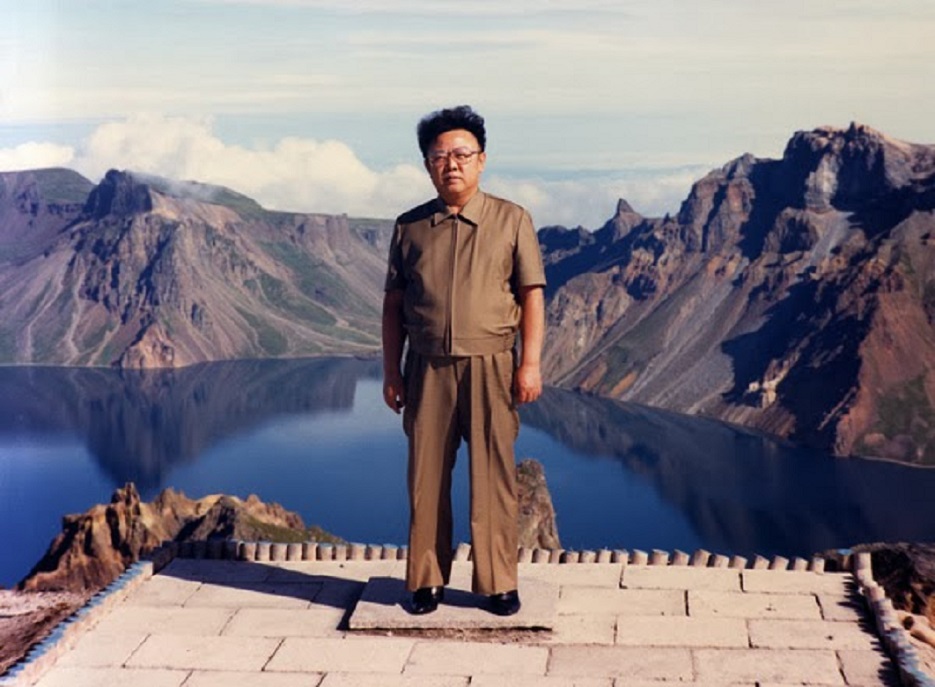 Kim Jong-il (Kim Jong Un's father, birth name Yuri Irsenovich Kim (1941 – 2011) was the Supreme Leader of Democratic People's Republic of Korea (North Korea) from the time of his father's death in 1994 until his own death in 2011. He was the son of Kim Il-Sŏng. Official North Korean propaganda said that Jong-il was born on Mount Paektu (a holy mountain in Korea); but most historians think that he was born near Chabarowsk in the Soviet Union. Inside North Korea, it was the law that no one could try to replace Jong-il as leader of the country. He was sometimes referred to as the "Dear Leader", but this was not an official title. His official title was "Chairman of the National Defense Commission of North Korea", "Supreme Commander of the Korean People's Army" and "General Secretary of the Workers' Party of Korea". Many people in North Korea were imprisoned or killed for speaking out against the Kim regime. Almost everyone in North Korea wore a small pin with a picture of Kim Jŏng-Il or Kim Il-Sŏng on it.
Kim Jong-il (Kim Jong Un's father, birth name Yuri Irsenovich Kim (1941 – 2011) was the Supreme Leader of Democratic People's Republic of Korea (North Korea) from the time of his father's death in 1994 until his own death in 2011. He was the son of Kim Il-Sŏng. Official North Korean propaganda said that Jong-il was born on Mount Paektu (a holy mountain in Korea); but most historians think that he was born near Chabarowsk in the Soviet Union. Inside North Korea, it was the law that no one could try to replace Jong-il as leader of the country. He was sometimes referred to as the "Dear Leader", but this was not an official title. His official title was "Chairman of the National Defense Commission of North Korea", "Supreme Commander of the Korean People's Army" and "General Secretary of the Workers' Party of Korea". Many people in North Korea were imprisoned or killed for speaking out against the Kim regime. Almost everyone in North Korea wore a small pin with a picture of Kim Jŏng-Il or Kim Il-Sŏng on it.
Kim Il-sung's proposal for the Democratic Federal Republic of Goryeo that would join North and South. In 2001, the population was reminded of the 4th anniversary of Kim Jong-il's election to General Secretary of the WPK along with praise for his Military First Policy. To make clear who was to revere, an article on the "Revolutionary Spirit of Soldiers" appeared on Oct. 9th, providing contrast to praise for the "invincible" Party the following day. This clearly was the time of Seongun, the recipe for overcoming the "arduous march". In 2002, the decisive role of ideology was emphasized. The Party was lauded as the guide of the Korean people, with heavy emphasis on its economic achievements. And a few days after Assistant Secretary of State James Kelly's visit to Pyongyang and just before his statement that marked the beginning of the second nuclear crisis, an article describing the Party's rosy future made clear that military affairs had to be placed above all else. Again, the People's Army was stressed as the core and main force of the Party. In 2004, no mention was made of Kim Jong-il's anniversary as General Secretary. Instead, the spirit of self-reliance was put forward as the central theme, making clear that refusal to bow to any outside pressure including sanctions was the sure path to victory in all fields. In 2005, the Rodong Sinmun went one step further, arguing that the Party had made great contributions beyond its own country, to the global cause of human independence by putting forward Seongun. On its 60th anniversary in 2006, the Party was again presented as the "great mother" of its children, the people. The word Seongun did not appear this time. It was, however, back one year later, when it was declared that in this Seongun era, it was the consistent policy of the Party to "remold man". A ground-breaking ceremony was held for a monument for "Protectors of Arts for the Century", identified as Kim Il-sung and Kim Jong-il. On Oct. 8th, the "40-odd year history" of Kim Jong-il's leadership of the Party was celebrated in an editorial, partly explaining why his election to Secretary General had not been mentioned anymore, but also leaving readers to wonder how it was possible to claim four decades of Party leadership (the term "party center" or dangjungang, understood as an euphemism for Kim Jong-il, had emerged only in the 1970s). Seongun was not mentioned; the next day, however, Rodong Sinmun reported the country's first nuclear test, which was followed by a new year's editorial in January 2007 that emphasized economic construction now that the defense issue had been settled by becoming a nuclear power.In October 2007, an article praised the People's Army, recalling a banquet speech of Kim Il-sung as far back as 1947 as if there were no more appropriate reason but omitting Seongun. The Army was displayed as a loyal instrument with duties assigned by "the Party, the leader, the country, and the people" (in that order). Note that the Party comes first, even before the leader, and that there was no description of the military as the core or main force of the Party. On Oct. 9th, an article summarized the history of the Party and reminded North Koreans that it was Kim Il-sung's Party; in other words, disloyalty to the Party would mean disloyalty to Kim Il-sung. The single-minded unity of party, leader and people was called for. This could be the year of the long-awaited 7th Party Congress, 32 years after the 6th in 1980, though events could also force an acceleration of the pace. Recall that this congress served the purpose of officially introducing Kim Jong-il as the next leader. This time, we could see the Party taking over the role of a church, safeguarding ideology and the leadership of the two "Eternal" leaders, forming or organizing the collective leadership that seems to be the only logical step, and appointing a leader who will not be Great but visible. The recent homage to the Party's monument could be the first step in the process of announcing this solution; the next Great Leader of North Korea could be Mother Party.North Korea is an international problem with no good solution. Eventually the North as we know it will disappear. Until then the country will pose a difficult challenge for all of its neighbors, including the PRC. The North Korean nuclear crisis has been brewing for a generation. Perhaps most important, the North Korean regime is brutal in its use of force. Dissent is detected through an elaborate network of informants working for multiple internal security agencies. People accused of relatively minor offenses undergo "reeducation"; those accused of more serious transgressions are either immediately executed or interred in miserable political prison camps. Even more daunting, according to the "three generations" policy, the regime punishes not only the individual responsible for the transgressions but his or her whole family.
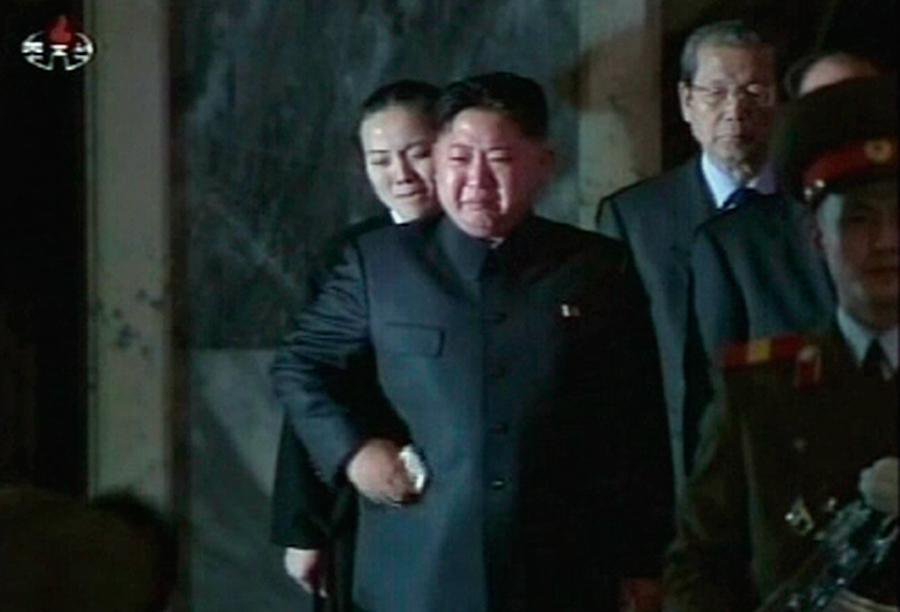
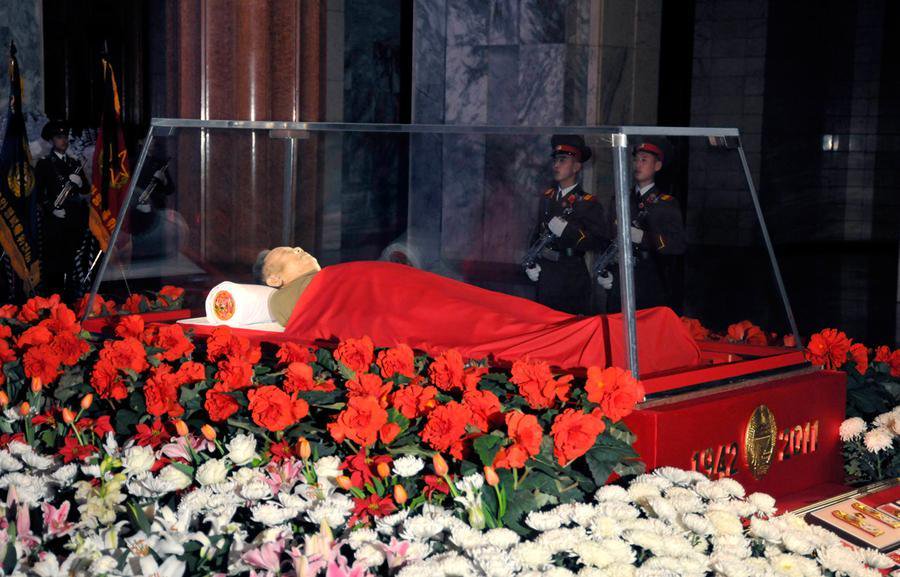
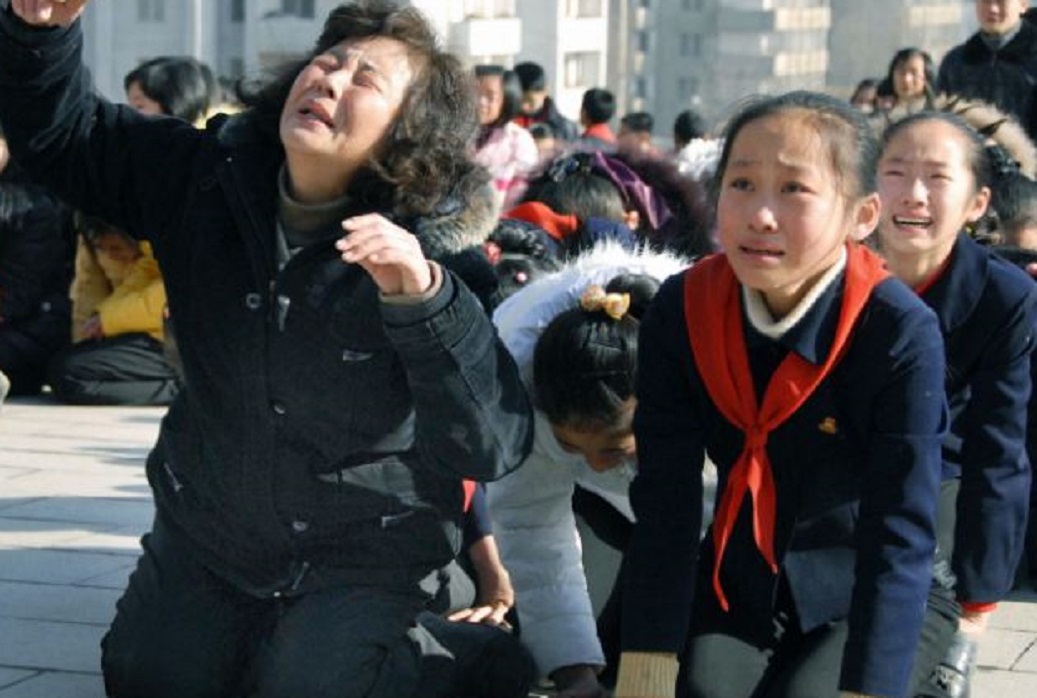
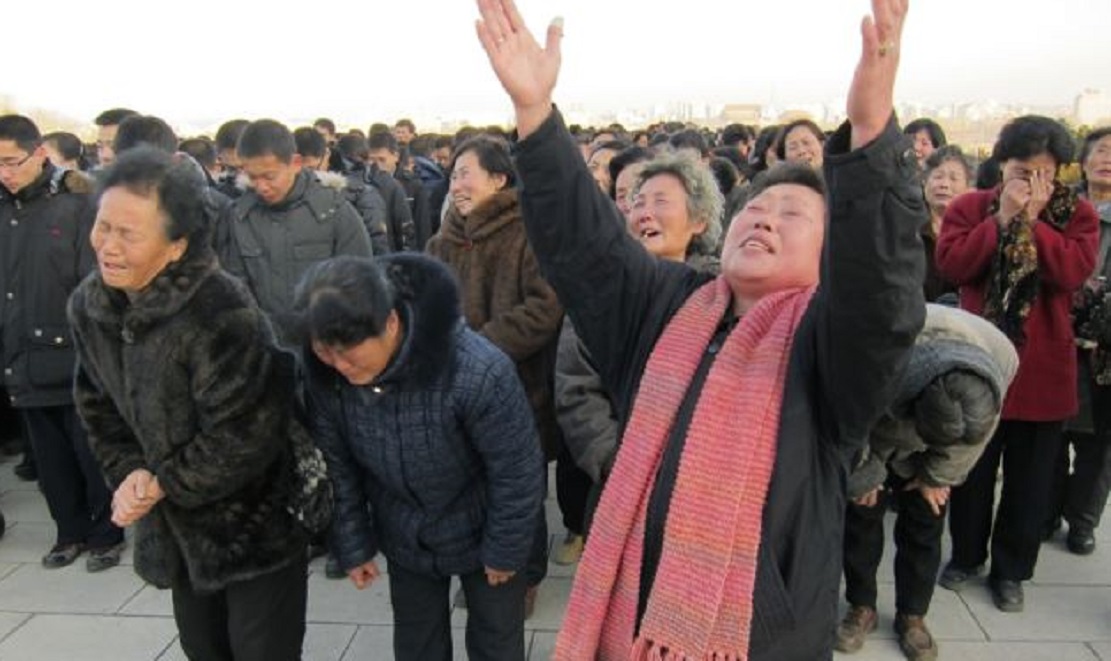 Kim
Jong Un cries as his father, North Korea's late leader Kim Jong Il,
lies in state during the run-up to his funeral in Pyongyang.North Korea's hardline regime is punishing those who did not cry at the death of dictator Kim Jong-il, according to reports.Sentences
of at least six months in labour camps are also apparently being given
to those who didn't go to the organised mourning events, while anyone
who criticised the new leader Kim Jong-un is also being punished.
Kim
Jong Un cries as his father, North Korea's late leader Kim Jong Il,
lies in state during the run-up to his funeral in Pyongyang.North Korea's hardline regime is punishing those who did not cry at the death of dictator Kim Jong-il, according to reports.Sentences
of at least six months in labour camps are also apparently being given
to those who didn't go to the organised mourning events, while anyone
who criticised the new leader Kim Jong-un is also being punished.
